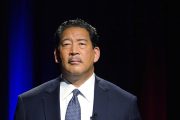
The congressional debate over illegal immigration continues to get increasingly contentious and divisive as two factions within the GOP clash on the issue. While House Republican leaders are preparing immigration proposals that qualify as amnesty, conservative Republicans are creating their own proposals in opposition to their leaders.
Breitbart.com reported last week, “Aides from over a dozen House offices secretly convened today on the Senate side of the Capitol at a meeting organized by Senator Jeff Sessions of Alabama, a top immigration hawk who has recently involved himself more aggressively in the affairs of the lower chamber.”
Breitbart News obtained a copy of the invitation to the meeting, which read, “Over here in the Senate working for Senator Sessions, we learned a lot last year about the strategies employed by the powerful forces pushing bad immigration policies — and how to counter them.”
According to those closely involved, conservatives are working to issue their own immigration principles to compete with the document House Speaker John Boehner is drafting.
“There is definitely a growing mood of confusion and aggravation among conservatives in the House over the immigration issue right now,” one House GOP aide said in an e-mail to Breitbart News, adding that many on the Right find the “political logic” of riling up the party’s base so close to a low-turnout midterm election baffling. “Do we really want to just give up the midterms like this?” the aide asked.
The Republicans plan to gather this week in Maryland to discuss the future of the party, and the debate on immigration is setting the stage for what could prove to be a difficult three-day retreat.
House leaders, such as Budget Committee chairman Rep. Paul Ryan and Majority Whip Rep. Kevin McCarthy, have become outspoken on their embrace of immigration reform, with McCarthy even endorsing “legal status” for illegal aliens.
Breitbart News writes, “Boehner’s strong desire to push immigration reform in 2014 has become clearer in recent weeks after he hired a former top aide to Senator John McCain to work on immigration issues and began drafting a set of immigration ‘principles’ to unveil as the GOP’s position on the issue in coming days.”
Naturally, members of the Tea Party are appalled by the assertions made by GOP leaders. “I don’t know why in the world House Republicans would move on immigration legislation in 2014,” said Representative Jeff Duncan of South Carolina.
Representative Jim Bridenstine of Oklahoma pointed to the violence at the border and argued that securing the border is a far more urgent priority. “We have on the border of the United States 100,000 dead bodies just south of our border,” Bridenstine said. “We focus on Syria because that’s where the president wants to focus, while we have a crisis on our own southern border. And it’s because we have an insecure border.”
Ironically, Homeland Security Secretary Jeh Johnson, whose primary focus should be on the security of the homeland, is an outspoken advocate of amnesty. On Friday, he told the U.S. Conference of Mayors that the 11 million illegals in this country have “earned the right to be citizens. An earned path to citizenship for those currently present in this country is a matter of, in my view, homeland security to encourage people to come out from the shadows,” said Johnson. “It is also, frankly, in my judgment, a matter of who we are as Americans to offer the opportunity to those who want to be citizens, who’ve earned the right to be citizens, who are present in this country — many of whom came here as children — to have the opportunity that we all have to try to become American citizens.”
Throughout Johnson’s speech, he continually called for “comprehensive immigration reform,” a seemingly innocuous term that in actuality has heavy connotations.
“Comprehensive immigration reform would also promote a more effective and efficient system for enforcing our immigration laws, and should include an earned path to citizenship for the approximately 11-and-a-half-million undocumented immigrants present in this country, something like 86% of whom have been here almost 10 years,” Johnson said.
John F. McManus, president of The John Birch Society, observed, “The use of the word ‘comprehensive’ means amnesty in one form or the other.”
McManus pointed out during his “Stealing the American Dream” speaking tour in 2010 that Article IV, Section 4 of the U.S. Constitution states that it is the role of government to “protect each of the states against invasion.” McManus posed the question that if the presence of 12-20 million illegal aliens in the United States does not constitute an invasion, what does? McManus has also accused those who support amnesty of “rewarding law-breakers.”
The cost of educating, incarcerating, and providing medical care to the millions of illegals in America adds up to approximately $36 billion annually. Likewise, the influx of illegal aliens has helped contribute to the disappearance of the American culture.
But rather than asking the illegal immigrants to adhere to the same path to citizenship that legal immigrants have followed, people such as Johnson are asking for special permission to be granted to law-breakers.
The conservatives in the GOP have found support amongst some key groups, including the U.S. Commission on Civil Rights. In a letter sent to House GOP conference chairwoman Rep. Cathy McMorris Rodgers, Peter Kirsanow of the U.S. Commission on Civil Rights argued that amnesty could hurt low-income workers disproportionately. “President Obama’s new hobbyhorse is income inequality. Ironically, one of the most effective ways to increase income inequality is increasing the number of interchangeable workers in a labor pool. That is exactly what encouraging illegal immigration and granting legal status to illegal immigrants does,” he wrote.
Many have contended that a focus on deportations or a bigger fence — ideas at the heart of several conservative proposals — is misguided. Former Republican Representative Ron Paul of Texas has argued that the most effective way to reduce illegal immigration is to simply stop providing illegals with free services such as education and social services. “Get rid of the subsidies,” Paul told John Stossel during a 2007 interview. “You subsidize illegal immigration, you get more of it.”
And while GOP leaders seem intent to forge ahead with proposals advocating a path to citizenship for illegals, poll after poll continue to show that Americans largely oppose amnesty.
A new Quinnipiac University poll shows that 52 percent of Republicans and 42 percent of Independents would be less likely to vote for a legislator who supports a “path to citizenship for illegal immigrants.”
Those figures mark a significant increase in the number of Americans opposed since a May 2013 Quinnipiac poll showed that 36 percent of Republicans and 25 percent of Independents would be less likely to vote for a pro-amnesty legislator.
And a January 2014 Gallup poll reveals that only three percent of Americans believe immigration is a priority that should be addressed in 2014.




